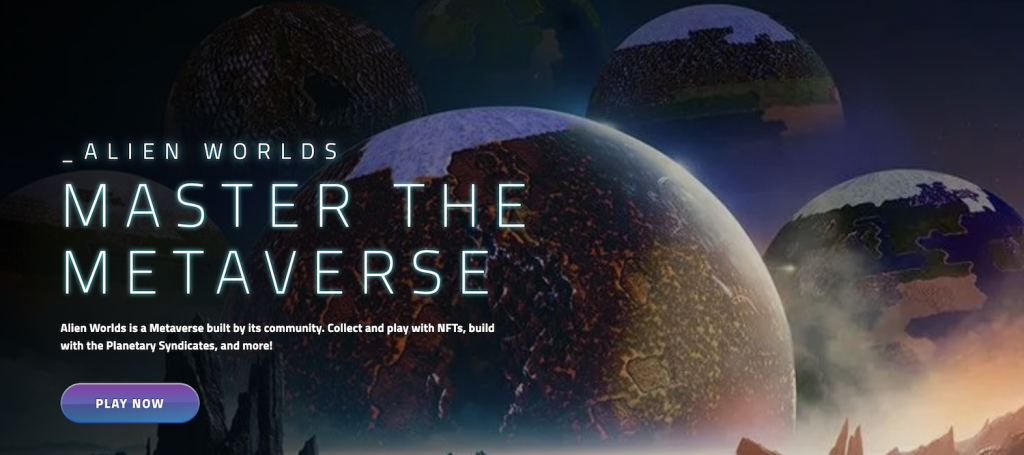Despite the crypto winter, blockchain gaming has proven resilient over the past year. As per research by DappRadar, in-game transactions were up 37 per cent in 2022, accounting for almost half of all on-chain activity in the dApp (decentralised applications) industry.
That being said, there are concerns surrounding future growth and a look at some of the most popular blockchain games explains why. For example, Alien Worlds is currently the most played blockchain game with over 200,000 daily active users.

Its core gameplay revolves around ‘mining’ Trillium (TLM) tokens – the game’s native cryptocurrency. Players can purchase mining tools, which exist as NFTs, to improve the rate at which they generate rewards. There are also ‘missions’ which involve staking TLM tokens with the chance of receiving in-game rewards.
Beyond clicking ‘mine’ and ‘stake’, there really isn’t too much to do on Alien Worlds. Its play-to-earn mechanics are the main draw and if games like Axie Infinity are any indication, such models don’t fare too well in the long run.
Several blockchain games in the market today prioritise the play-to-earn gaming model that only rewards players in the short term, neglecting the importance of creating an enjoyable gaming experience long term. This approach results in a lack of player interest and retention, hindering the growth of the Web3 gaming space.
– Lawrence Lin, Director of Blockchain, Razer
For a traditional gamer, Alien Worlds doesn’t have much to offer. There’s little by way of skill, strategy, or storyline which would draw someone to this game. This is the grand challenge which the blockchain gaming industry faces today, and it’s one which Razer’s hoping to solve.
Back to basics
We believe that the foundation of any successful game – be it Web2 or Web3 – is immersive and engaging gameplay. While blockchain technology can bring innovative new features to games, the core fundamentals for what makes a great game remain unchanged, and it’s up to game developers to create compelling user experiences.
– Lawrence Lin, Director of Blockchain, Razer
The play-to-earn model has proven to be riddled with flaws. It usually relies on a continuous stream of new users to prop up and sustain the in-game economy.
Once the hype dies down, so does the earning potential. Without any other reason – such as good gameplay – for users to stay, that usually marks the end for the entire project.

With Razer’s newly launched zVentures Web3 Incubator, the company aims to support the next generation of blockchain gaming companies. In doing so, the company is carefully considering the needs of its established user base of traditional gamers.
“To ensure the sustainability of the Web3 gaming space, we must adopt strategies that prioritise long-term engagement over short-term rewards,” Lin explains. “Game developers should create complex and immersive game worlds that encourage players to keep exploring even after they have exhausted all available rewards.”
Lin emphasises that the fundamental principles of gaming must remain unchanged even as Web3 mechanics are introduced to the ecosystem.
How can Web3 improve the gaming experience?
Putting the play-to-earn model aside, there are a number of ways through which Web3 concepts can benefit gaming. By providing users with control and ownership of in-game assets, NFTs and crypto tokens could help reshape in-game economics.

One of the most compelling aspects of Web 3.0 gaming is its ability to create a new paradigm for player engagement, where gamers have greater control over the ecosystem and microeconomics of the game. This offers a level of transparency and ownership that is not typically found in traditional games.
– Lawrence Lin, Director of Blockchain, Razer
In the future, players could share in the earnings – typically reserved for gaming companies – by trading assets which they’ve collected in the game.
“With community-driven governance systems, players also have a say in the development of the game and the distribution of rewards, creating more democratic and engaging gaming experiences,” Lin adds.
Razer foresees a convergence in the target audience for traditional and Web3 games. For this to happen, such ideas must be used judiciously – as additional points of entertainment and engagement rather than a primary selling point.
Can Web3 compete with AAA games?
In 2022, there were around 800,000 users playing Web3 games on a daily basis. In comparison, Minecraft alone records over a million active users every day.
Web3 has a long way to go before it captures mainstream attention, however, crossovers with traditional gaming could speed up the process.
“We may see more crossover between Web3 games and traditional games as the gaming space evolves, with developers incorporating blockchain technology into mainstream titles,” says Lin.
It’s likely that blockchain technology will help supply unique value propositions that allow for more innovation in game development. “Rather than viewing it as a competition [with traditional AAA titles], it’s more accurate to see Web3 games as the next step in technology adoption in gaming.”
With the zVentures Web3 Incubator, Razer aims to facilitate this development and help bridge the gap between the traditional and Web3 gaming spaces.
Featured Image Credit: Razer










